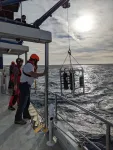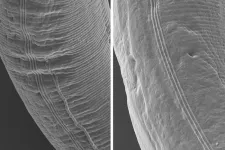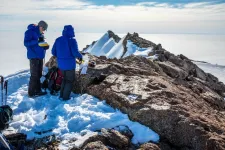(Press-News.org) In a study conducted in the lab as well as during the COVID-19 lockdowns, participants reported higher levels of tiredness after eight hours of social isolation. The results suggest that low energy may be a basic human response to a lack of social contact. The study conducted at the University of Vienna and published in Psychological Science also showed that this response was affected by social personality traits of the participants.
If we do not eat for an extended period, a series of biological processes ensue that create a craving sensation we recognize as hunger. As a social species, we also need other people to survive. Evidence shows that a lack of social contact induces a craving response in our brains comparable to hunger, which motivates us to reconnect. The related "social homeostasis" hypothesis suggests that there is a dedicated homeostatic system that autonomously regulates our need for social contact. However, we know very little about the psychological responses to social isolation. Moreover, we do not know how these findings translate to the social isolation we experience in our daily lives, including the unique context of the COVID-19 lockdowns.
A group of scientists led by Giorgia Silani from the University of Vienna investigated the effects of social isolation using comparable methodology across two contexts: in the laboratory and at home during COVID-19 lockdown. For the study, 30 female volunteers came into the lab on three separate days, spending eight hours without social contact or without food or with both social contact and food. Multiple times throughout the day, they indicated their stress, mood, and fatigue, while physiological stress responses, such as heart rate and cortisol, were recorded by the scientists. In order to validate the results of the laboratory study, the results were compared with measurements from a study conducted during the lockdown in Austria and Italy in spring 2020. From this study, they used data from 87 participants who had spent at least an eight-hour period in isolation and whose stress and behavioural effects were assessed with the same measurements several times a day for seven days.
"In the lab study, we found striking similarities between social isolation and food deprivation. Both states induced lowered energy and heightened fatigue, which is surprising given that food deprivation literally makes us lose energy, while social isolation would not", first authors Ana Stijovic and Paul Forbes said. This result is further supported by the validation with data obtained during the lockdowns – participants who lived alone during the lockdown and who were generally more sociable also reported lower energy on days on which they were isolated, compared to days on which they had social interactions.
The authors propose that lowered energy may be a part of our homeostatic response to a lack of social contact and a potential precursor of some more detrimental effects of long-term social isolation. "It is well-known that long-term loneliness and fatigue are related, but we know little about the immediate mechanisms that underlie this link. The fact that we see this effect even after a short period of social isolation suggests that low energy could be a 'social homeostatic' adaptive response, which on the long run can become maladaptive", explains Silani.
The study also found that contextual and personality factors modulated the effect of social isolation on fatigue; therefore, future studies will need to identify individuals who are most at risk from the effects of isolation.
END
Tired of being alone: How social isolation impacts on our energy
Eight hours without social contact can lead to a reduction in energy similar to eight hours without food
2023-04-04
ELSE PRESS RELEASES FROM THIS DATE:
Insilico Medicine presents four posters featuring AI-designed anti-cancer drugs at AACR
2023-04-04
Insilico Medicine (“Insilico”), a clinical-stage generative artificial intelligence (AI)-driven drug discovery company, today announced that four abstracts have been accepted as poster presentations at the American Association for Cancer Research (AACR) Annual Meeting 2023.
Insilico will present four novel inhibitors for the treatment of cancer developed with its end-to-end Pharma.AI platform. Drawing from trillions of data points and millions of compounds and molecular fragments, the platform uses ...
FAU developed AUTOHOLO shows potential as red tide warning system
2023-04-04
Red tides, caused by Karenia brevis blooms, are a recurring problem in the coastal Gulf of Mexico. The organism, Karenia brevis, produces toxins that can cause fish kills, respiratory irritation in humans and cause death in sea turtles, dolphins, manatees and birds.
The ability to detect red tide blooms at all life stages and cell concentrations is critical to increasing predictive capabilities and developing potential mitigation strategies to protect public health and vital resources.
Current methods used to monitor red tide such as microscopic identification and enumeration, standard flow cytometry, as well as others have limitations. Some of these ...
Third major accreditation to help OICR Genomics power next generation of precision medicine
2023-04-04
April 4, 2023, TORONTO — Becoming the first genomics lab to be accredited by three of the leading North American accreditation organizations positions OICR Genomics to generate new discoveries about what drives diseases like cancer and new, personalized ways to diagnose and treat them.
The lab earned a Clinical Laboratory Improvement Amendments (CLIA) certificate of accreditation in January 2023 for its whole genome and whole transcriptome sequencing assay, a comprehensive genetic test that can find all changes in the DNA of a tumour. This comes after accreditation from the College of American Pathologists (CAP) in 2021 and from Accreditation Canada Diagnostics (ACD) — ...
Discovery could hold the key to healthy aging during global warming
2023-04-04
SPOKANE, Wash.—Researchers have long known that many animals live longer in colder climates than in warmer climates. New research in C. elegans nematode worms suggests that this phenomenon is tied to a protein found in the nervous system that controls the expression of collagens, the primary building block of skin, bone and connective tissue in many animals.
Since the C. elegans’ protein is similar to nervous system receptor proteins found in other species including humans, the discovery potentially brings scientists closer to finding ways to harness collagen expression to slow down human aging and increase lifespan in the ...
New shape-shifting antibiotics could fight deadly infections
2023-04-04
In the United States alone, drug-resistant bacteria and fungi infect almost 3 million people per year and kill about 35,000. Antibiotics are essential and effective, but in recent years overuse has led to some bacteria developing resistance to them. The infections are so difficult to treat, the World Health Organization deemed antibiotic resistance a top 10 global public health threat.
Now, Professor John E. Moses at Cold Spring Harbor Laboratory (CSHL) has created a new weapon against these drug-resistant ...
The ice in Antarctica has melted before
2023-04-04
Sixty per cent of the world's fresh water is bound up in Antarctic ice sheets. Thirty million cubic kilometres of ice is perhaps a difficult number to grasp. But if absolutely all Antarctica’s ice melted, the seas would rise by 58 metres on average.
“The ice sheet in East Antarctica stores enormous amounts of water. This means that this is the biggest possible source of future sea level rise – up to 53 meters if all of the East Antarctic ice melts – and is seen as the largest source of uncertainties in the ...
Sailing cargo ships can benefit from new aerodynamic tech
2023-04-04
A research team at Chalmers University of Technology is the first to demonstrate a unique method that reduces the aerodynamic resistance of ships by 7.5 per cent. This opens the way for large cargo ships borne across the oceans by wind alone, as wind-powered ships are more affected by aerodynamic drag than fossil-fueled ones.
To hit international climate targets, the carbon emissions from shipping must be reduced by more than 50 per cent by 2050 compared to 2008 levels. As much as 99 per cent of global shipping is currently dependent on fossil fuels. Even though electricity may carry smaller ferries ...
Dozens of brain proteins may play a critical role in body weight regulation
2023-04-04
Québec City, April 4, 2023 – Genetic factors could contribute to up to 50-75% of the variance in body mass index, or BMI, in the population. By analyzing the genome of more than 800,000 people of European descent, a research team from Université Laval and the Quebec Heart and Lung Institute Research Centre has identified 60 unique proteins expressed in the brain that may be critical regulators of body weight.
This study explored the link between genetic regions associated with body weight and the proteins expressed in the brain. "Previous ...
Communication may guide family members’ decisions after sudden cardiac death
2023-04-04
Research Highlights:
Surviving family members of a person who died from sudden cardiac death rely on information from death investigators and health care professionals to process their relative’s death and understand their own risk of inherited heart conditions.
The type and timing of the communication received from death investigators and health care professionals influences family members’ experiences and decisions about whether to pursue genetic screening.
Future research is needed to guide death investigators and health ...
New cyber software can verify how much knowledge AI really knows
2023-04-04
With a growing interest in generative artificial intelligence (AI) systems worldwide, researchers at the University of Surrey have created software that is able to verify how much information an AI farmed from an organisation’s digital database.
Surrey’s verification software can be used as part of a company’s online security protocol, helping an organisation understand whether an AI has learned too much or even accessed sensitive data.
The software is also capable of identifying whether AI has identified and is capable of exploiting flaws in software code. For example, in ...
LAST 30 PRESS RELEASES:
Natural selection operates on multiple levels, comprehensive review of scientific studies shows
Developing a national research program on liquid metals for fusion
AI-powered ECG could help guide lifelong heart monitoring for patients with repaired tetralogy of fallot
Global shark bites return to average in 2025, with a smaller proportion in the United States
Millions are unaware of heart risks that don’t start in the heart
What freezing plants in blocks of ice can tell us about the future of Svalbard’s plant communities
A new vascularized tissueoid-on-a-chip model for liver regeneration and transplant rejection
Augmented reality menus may help restaurants attract more customers, improve brand perceptions
Power grids to epidemics: study shows small patterns trigger systemic failures
Computational insights into the interactions of andrographolide derivative SRJ09 with histone deacetylase for the management of beta thalassemia
A genetic brake that forms our muscles
CHEST announces first class of certified critical care advanced practice providers awarded CCAPP Designation
Jeonbuk National University researchers develop an innovative prussian-blue based electrode for effective and efficient cesium removal
Self-organization of cell-sized chiral rotating actin rings driven by a chiral myosin
Report: US history polarizes generations, but has potential to unite
Tiny bubbles, big breakthrough: Cracking cancer’s “fortress”
A biological material that becomes stronger when wet could replace plastics
Glacial feast: Seals caught closer to glaciers had fuller stomachs
Get the picture? High-tech, low-cost lens focuses on global consumer markets
Antimicrobial resistance in foodborne bacteria remains a public health concern in Europe
Safer batteries for storing energy at massive scale
How can you rescue a “kidnapped” robot? A new AI system helps the robot regain its sense of location in dynamic, ever-changing environments
Brainwaves of mothers and children synchronize when playing together – even in an acquired language
A holiday to better recovery
Cal Poly’s fifth Climate Solutions Now conference to take place Feb. 23-27
Mask-wearing during COVID-19 linked to reduced air pollution–triggered heart attack risk in Japan
Achieving cross-coupling reactions of fatty amide reduction radicals via iridium-photorelay catalysis and other strategies
Shorter may be sweeter: Study finds 15-second health ads can curb junk food cravings
Family relationships identified in Stone Age graves on Gotland
Effectiveness of exercise to ease osteoarthritis symptoms likely minimal and transient
[Press-News.org] Tired of being alone: How social isolation impacts on our energyEight hours without social contact can lead to a reduction in energy similar to eight hours without food





